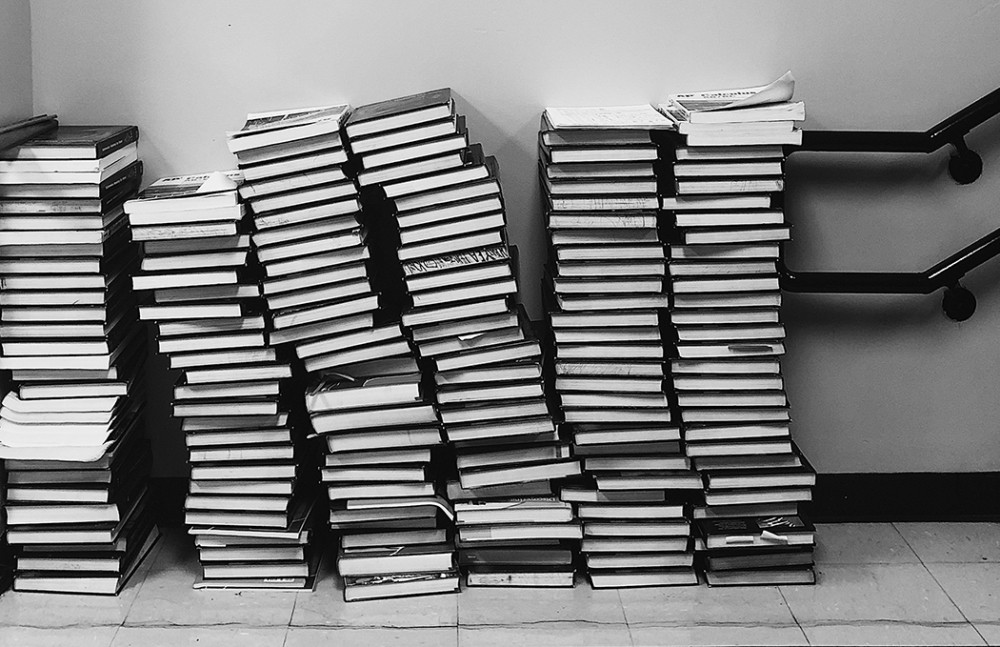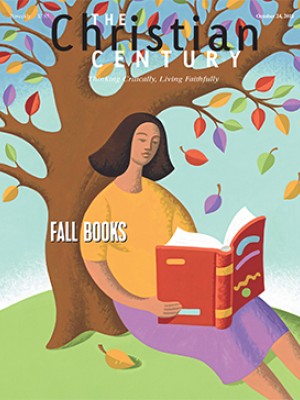It’s time for me to let go of some books
Someone else should have a turn feeling guilty about not reading Finnegans Wake.

“Have you read all of these books?” the young man, built like a linebacker, asked as he wiped sweat off his brow with the sleeve of his T-shirt. He had just finished heaving the last of 52 boxes of my books into the back of his truck. I’ve fielded that question so often through the years that I have a stock answer: “Some of them twice.” But he had worked so hard, and for a wonderful charity that sells books, that the usual flip response didn’t seem quite right. I replied, “Not all of them, but it is time they sit on someone else’s shelf.”
That day was the culmination of a long process of sorting and giving away books made necessary by considerable downsizing in my life. Not long before, I had three offices, each one chock-o-block with books. Every time I entered one of those offices there seemed to be more books, as if they had bred like mice whenever the door was closed. But now I was in one small office. Obviously, it was time to do some pruning.
Read our latest issue or browse back issues.
Deciding which books to keep and which to give away is not a simple task. It is not like giving away clothes that no longer fit or sports equipment you are sure you will never use again. My relationship with books is considerably more complex than with other objects, and so is the process of deciding which books will remain with me and which will be cut loose.
A psychologist once explained to me why sorting is so exhausting. From all outward appearances, someone sorting through stacks of papers or shelves of books can seem downright languorous compared to someone who is chopping wood. At the end of the day, however, the person who has been sorting will likely be more drained of energy. The difference, she explained, is that when you are sorting, every item you pick up requires a decision. In sorting there is no familiar rhythm to fall back on, no chance to find a mindless groove.
The first decisions I made when sorting through my library were easy. I was no longer the pastor of a church, so books on church growth or pastoral care were easy to give away. Saying good-bye to those books was no more emotional than giving away my baseball bats when I no longer played the game. Some other books were easy to part with: pop psychology books that were all the rage for 15 minutes, books of turgid poetry, self-published books of dubious merit given to me by their authors.
I have concluded that I will never read James Joyce’s Finnegans Wake. I borrowed it from my high school English teacher and, not wanting to disappoint her by returning it unread, I simply kept it, my guilt postponed somewhat by the conviction that I would read it someday. It seems about time for someone else to feel guilty about not reading it, so I gave it away.
When I had finished this first round, the books that were easily voted off the island filled no more than five boxes. Then it got harder.
Sorting books is complex, in part because I keep books for different reasons. Some of them I intend to read. (Surely, when I retire, utterly stripped of excuses, I will finally get around to reading Anna Karenina, right?) Other books I have read and want to read again. Wallace Stegner’s Crossing to Safety, George Eliot’s Middlemarch, and Richard Russo’s Straight Man are all in that category, as are the short stories of John Cheever, Works of Love by Søren Kierkegaard, and Roland Bainton’s biography of Martin Luther, Here I Stand.
Some books I saved for reasons that have very little to do with reading in the future. There are the books my father gave me from his own library when he was at a stage of life similar to the one I am in now. I particularly love his notes in the margins, which, now that he is no longer alive, I read as if they are cryptic messages from beyond the grave. I doubt that I will ever again read Harry Emerson Fosdick’s autobiography, The Living of These Days, but I would never part with it because it contains a warm inscription from Fosdick to my father. I have more volumes of Robert Frost’s poetry than I will ever read, but one is inscribed in the familiar handwriting of my high school girlfriend, offering words that are both earnest and hopeful, words made all the more poignant because in midlife she committed suicide. I cannot bear to give that book away.
Other books are like old friends that I just like having around. I would miss them if they never again could greet me from their perch on the shelf. In my library is the complete oeuvre of a few authors—Frederick Buechner, Barbara Brown Taylor, E. B. White, Calvin Trillin. I do not love each of these authors’ books equally, but I can’t bring myself to give any of them away. It would feel like breaking up a family.
I kept some books because they evoke a certain time in my life. In 1974, I devoured Louis Sheaffer’s two-volume biography of Eugene O’Neill, all 1,200 pages of it, while riding the train into Manhattan for a summer job. Even now there is a train ticket tucked in the second volume which doubled as a bookmark all those years ago. Opening those volumes, taking in the dusty smell that emerges, is a sure way to be transported back to that time in my life.
Some books are more like trophies. I read every word of Paul Tillich’s three-volume Systematic Theology, and it contains all of my careful underlining to prove it. I want to get full credit for having slogged through it many years ago, so it remains on my shelf.
I keep some books as a way to nod appreciatively in their direction. I may not take the time to read them, but I cared enough to procure them. That’s got to count for something. After all, only one of the things I appreciate about books is reading them. I know I am not the only one who feels this way. The first time I walked into Buechner’s extensive and beautiful library, I asked him the same silly question that I’ve been asked so many times: “Have you read all of these books?” His response was much better than mine, however: “Well, why would I want to do that?”
The Argentine author Jorge Luis Borges spoke for many book lovers when he said, “I have always imagined that paradise will be a kind of library.” I hope he is right. And being something of a universalist, I further imagine that in paradise I will be reunited with all of my books—even the ones I gave away.
A version of this article appears in the print edition under the title “Time to cull my library.”






